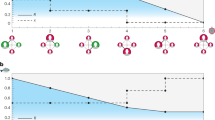Abstract
In this paper, we consider the problem of the mechanism design for the multi-agents system. We develop the social learning model for the mechanism design for creating the collective action with an efficient cost sharing rule. We consider the situation in which self-interest agents have incentives to cooperate each other for jointly acquiring the environmental level with sharing the necessary cost. We obtain the optimal level of the environment to be acquired and the cost allocation rule so that their individual rationality is satisfied, and at the same time the social rationality is also satisfied. We show that the factors such as the value (worth) of the environmental level perceived by each agent and the cost affect the level the collective action. A social rule of allocating the common cost among agents is developed with decentralized transaction mechanism. We formulate and analyze the problem of cooperating multiple agents under uncertainty. We show that when agents cooperate in order to encounter uncertainty when acting alone, their benefits would not be as attractive, and hence cooperate to share the risk. As a specific example, we consider the model of obtaining the environmental level by sharing cost. We propose the negotiation mechanism for sharing cost among agents. With that mechanism, they can learn and obtain the unbiased and fare cost distribution rule.
Preview
Unable to display preview. Download preview PDF.
Similar content being viewed by others
References
Campbell, D.E: Incentives. Cambridge University Press, Cambridge (1995)
von Winterfeldt, D., Edwards, W.: Decision Analysis And Behavioral Research. Cambridge University Press, Cambridge (1986)
Fudenberg, D.: Game Theory. MIT Press, Cambridge (1991)
Rosenschein, J., Zlotkin, G.: Rules of Encounter, Designing Conventions for Automated Negotiation among Computers. MIT Press, Cambridge (1994)
Gasser, L.: Computational Organization Research. In: ICMAS’95 Proceedings, pp. 414–415 (1995)
Zlotkin, G., Rosenschein, J.S.: Mechanism design for automated negotiation. Artificial Intelligence 86, 195–244 (1996)
Kumon, S.: Information Civilization Theory. NTT Press, Tokyo (1979)
Baliga, S., Maskin, E.: Mechanism Design for the Environment (2002)
Masahiro, O., Koutaro, S.: Micro-economics II. Iwanami press, Tokyo (1988)
Author information
Authors and Affiliations
Editor information
Rights and permissions
Copyright information
© 2007 Springer Berlin Heidelberg
About this paper
Cite this paper
Tomita, S., Namatame, A. (2007). Mechanism Design for Environmental Issues. In: Sakurai, A., Hasida, K., Nitta, K. (eds) New Frontiers in Artificial Intelligence. JSAI JSAI 2003 2004. Lecture Notes in Computer Science(), vol 3609. Springer, Berlin, Heidelberg. https://doi.org/10.1007/978-3-540-71009-7_7
Download citation
DOI: https://doi.org/10.1007/978-3-540-71009-7_7
Published:
Publisher Name: Springer, Berlin, Heidelberg
Print ISBN: 978-3-540-71008-0
Online ISBN: 978-3-540-71009-7
eBook Packages: Computer ScienceComputer Science (R0)




